- Home
- Philip Pullman
His Dark Materials 01 - The Golden Compass Page 4
His Dark Materials 01 - The Golden Compass Read online
Page 4
But even this was forgotten when the other enemies threatened. One enemy was perennial: the brickburners' children, who lived by the claybeds and were despised by collegers and townies alike. Last year Lyra and some townies had made a temporary truce and raided the claybeds, pelting the brick-burners' children with lumps of heavy clay and tipping over the soggy castle they'd built, before rolling them over and over in the clinging substance they lived by until victors and vanquished alike resembled a flock of shrieking golems.
The other regular enemy was seasonal. The gyptian families, who lived in canal boats, came and went with the spring and autumn fairs, and were always good for a fight. There was one family of gyptians in particular, who regularly returned to their mooring in that part of the city known as Jericho, with whom Lyra'd been feuding ever since she could first throw a stone. When they were last in Oxford, she and Roger and some of the other kitchen boys from Jordan and St. Michael's College had laid an ambush for them, throwing mud at their brightly painted narrowboat until the whole family came out to chase them away—at which point the reserve squad under Lyra raided the boat and cast it off from the bank, to float down the canal, getting in the way of all the other water traffic while Lyra's raiders searched the boat from end to end, looking for the bung. Lyra firmly believed in this bung. If they pulled it out, she assured her troop, the boat would sink at once; but they didn't find it, and had to abandon ship when the gyptians caught them up, to flee dripping and crowing with triumph through the narrow lanes of Jericho.
That was Lyra's world and her delight. She was a coarse and greedy little savage, for the most part. But she always had a dim sense that it wasn't her whole world; that part of her also belonged in the grandeur and ritual of Jordan College; and that somewhere in her life there was a connection with the high world of politics represented by Lord Asriel. All she did with that knowledge was to give herself airs and lord it over the other urchins. It had never occurred to her to find out more.
So she had passed her childhood, like a half-wild cat. The only variation in her days came on those irregular occasions when Lord Asriel visited the College. A rich and powerful uncle was all very well to boast about, but the price of boasting was having to be caught by the most agile Scholar and brought to the Housekeeper to be washed and dressed in a clean frock, following which she was escorted (with many threats) to the Senior Common Room to have tea with Lord Asriel and an invited group of senior Scholars. She dreaded being seen by Roger. He'd caught sight of her on one of these occasions and hooted with laughter at this beribboned and pink-frilled vision. She had responded with a volley of shrieking curses that shocked the poor Scholar who was escorting her, and in the Senior Common Room she'd slumped mutinously in an armchair until the Master told her sharply to sit up, and then she'd glowered at them all till even the Chaplain had to laugh.
What happened on those awkward, formal visits never varied. After the tea, the Master and the other few Scholars who'd been invited left Lyra and her uncle together, and he called her to stand in front of him and tell him what she'd learned since his last visit. And she would mutter whatever she could dredge up about geometry or Arabic or history or anbarology, and he would sit back with one ankle resting on the other knee and watch her inscrutably until her words failed.
Last year, before his expedition to the North, he'd gone on to say, "And how do you spend your time when you're not diligently studying?"
And she mumbled, "I just play. Sort of around the College. Just...play, really."
And he said, "Let me see your hands, child."
She held out her hands for inspection, and he took them and turned them over to look at her fingernails. Beside him, his daemon lay sphinxlike on the carpet, swishing her tail occasionally and gazing unblinkingly at Lyra.
"Dirty," said Lord Asriel, pushing her hands away. "Don't they make you wash in this place?"
"Yes," she said. "But the Chaplain's fingernails are always dirty. They're even dirtier than mine."
"He's a learned man. What's your excuse?"
"I must've got them dirty after I washed."
"Where do you play to get so dirty?"
She looked at him suspiciously. She had the feeling that being on the roof was forbidden, though no one had actually said so. "In some of the old rooms," she said finally.
"And where else?"
"In the claybeds, sometimes."
"And?"
"Jericho and Port Meadow."
"Nowhere else?"
"No."
"You're a liar. I saw you on the roof only yesterday."
She bit her lip and said nothing. He was watching her sardonically.
"So, you play on the roof as well," he went on. "Do you ever go into the library?"
"No. I found a rook on the library roof, though," she went on.
"Did you? Did you catch it?"
"It had a hurt foot. I was going to kill it and roast it but Roger said we should help it get better. So we gave it scraps of food and some wine and then it got better and flew away."
"Who's Roger?"
"My friend. The kitchen boy."
"I see. So you've been all over the roof—"
"Not all over. You can't get onto the Sheldon Building because you have to jump up from Pilgrim's Tower across a gap. There's a skylight that opens onto it, but I'm not tall enough to reach it."
"You've been all over the roof except the Sheldon Building. What about underground?"
"Underground?"
"There's as much College below ground as there is above it. I'm surprised you haven't found that out. Well, I'm going in a minute. You look healthy enough. Here."
He fished in his pocket and drew out a handful of coins, from which he gave her five gold dollars.
"Haven't they taught you to say thank you?" he said.
"Thank you," she mumbled.
"Do you obey the Master?"
"Oh, yes."
"And respect the Scholars?"
"Yes."
Lord Asriel's daemon laughed softly. It was the first sound she'd made, and Lyra blushed.
"Go and play, then," said Lord Asriel.
Lyra turned and darted to the door with relief, remembering to turn and blurt out a "Goodbye."
So Lyra's life had been, before the day when she decided to hide in the Retiring Room, and first heard about Dust.
And of course the Librarian was wrong in saying to the Master that she wouldn't have been interested. She would have listened eagerly now to anyone who could tell her about Dust. She was to hear a great deal more about it in the months to come, and eventually she would know more about Dust than anyone in the world; but in the meantime, there was all the rich life of Jordan still being lived around her.
And in any case there was something else to think about. A rumor had been filtering through the streets for some weeks: a rumor that made some people laugh and others grow silent, as some people scoff at ghosts and others fear them. For no reason that anyone could imagine, children were beginning to disappear.
* * *
It would happen like this.
East along the great highway of the River Isis, thronged with slow-moving brick barges and asphalt boats and corn tankers, way down past Henley and Maidenhead to Teddington, where the tide from the German Ocean reaches, and further down still: to Mortlake, past the house of the great magician Dr. Dee; past Falkeshall, where the pleasure gardens spread out bright with fountains and banners by day, with tree lamps and fireworks by night; past White Hall Palace, where the king holds his weekly council of state; past the Shot Tower, dropping its endless drizzle of molten lead into vats of murky water; further down still, to where the river, wide and filthy now, swings in a great curve to the south.
This is Limehouse, and here is the child who is going to disappear.
He is called Tony Makarios. His mother thinks he's nine years old, but she has a poor memory that the drink has rotted; he might be eight, or ten. His surname is Greek, but like his age,
that is a guess on his mother's part, because he looks more Chinese than Greek, and there's Irish and Skraeling and Lascar in him from his mother's side too. Tony's not very bright, but he has a sort of clumsy tenderness that sometimes prompts him to give his mother a rough hug and plant a sticky kiss on her cheeks. The poor woman is usually too fuddled to start such a procedure herself; but she responds warmly enough, once she realizes what's happening.
At the moment Tony is hanging about the market in Pie Street. He's hungry. It's early evening, and he won't get fed at home. He's got a shilling in his pocket that a soldier gave him for taking a message to his best girl, but Tony's not going to waste that on food, when you can pick up so much for nothing.
So he wanders through the market, between the old-clothes stalls and the fortune-paper stalls, the fruitmongers and the fried-fish seller, with his little daemon on his shoulder, a sparrow, watching this way and that; and when a stall holder and her daemon are both looking elsewhere, a brisk chirp sounds, and Tony's hand shoots out and returns to his loose shirt with an apple or a couple of nuts, and finally with a hot pie.
The stall holder sees that, and shouts, and her cat daemon leaps, but Tony's sparrow is aloft and Tony himself halfway down the street already. Curses and abuse go with him, but not far. He stops running at the steps of St. Catherine's Oratory, where he sits down and takes out his steaming, battered prize, leaving a trail of gravy on his shirt.
And he's being watched. A lady in a long yellow-red fox-fur coat, a beautiful young lady whose dark hair falls, shining delicately, under the shadow of her fur-lined hood, is standing in the doorway of the oratory, half a dozen steps above him. It might be that a service is finishing, for light comes from the doorway behind her, an organ is playing inside, and the lady is holding a jeweled breviary.
Tony knows nothing of this. His face contentedly deep in the pie, his toes curled inward and his bare soles together, he sits and chews and swallows while his daemon becomes a mouse and grooms her whiskers.
The young lady's daemon is moving out from beside the fox-fur coat. He is in the form of a monkey, but no ordinary monkey: his fur is long and silky and of the most deep and lustrous gold. With sinuous movements he inches down the steps toward the boy, and sits a step above him.
Then the mouse senses something, and becomes a sparrow again, cocking her head a fraction sideways, and hops along the stone a step or two.
The monkey watches the sparrow; the sparrow watches the monkey.
The monkey reaches out slowly. His little hand is black, his nails perfect horny claws, his movements gentle and inviting. The sparrow can't resist. She hops further, and further, and then, with a little flutter, up on to the monkey's hand.
The monkey lifts her up, and gazes closely at her before standing and swinging back to his human, taking the sparrow daemon with him. The lady bends her scented head to whisper.
And then Tony turns. He can't help it.
"Ratter!" he says, half in alarm, his mouth full.
The sparrow chirps. It must be safe. Tony swallows his mouthful and stares.
"Hello," says the beautiful lady. "What's your name?"
"Tony."
"Where do you live, Tony?"
"Clarice Walk."
"What's in that pie?"
"Beefsteak."
"Do you like chocolatl?"
"Yeah!"
"As it happens, I've got more chocolatl than I can drink myself. Will you come and help me drink it?"
He's lost already. He was lost the moment his slow-witted daemon hopped onto the monkey's hand. He follows the beautiful young lady and the golden monkey down Denmark Street and along to Hangman's Wharf, and down King George's Steps to a little green door in the side of a tall warehouse. She knocks, the door is opened, they go in, the door is closed. Tony will never come out—at least, by that entrance; and he'll never see his mother again. She, poor drunken thing, will think he's run away, and when she remembers him, she'll think it was her fault, and sob her sorry heart out.
* * *
Little Tony Makarios wasn't the only child to be caught by the lady with the golden monkey. He found a dozen others in the cellar of the warehouse, boys and girls, none older than twelve or so; though since all of them had histories like his, none could be sure of their age. What Tony didn't notice, of course, was the factor that they all had in common. None of the children in that warm and steamy cellar had reached the age of puberty.
The kind lady saw him settled on a bench against the wall, and provided by a silent serving woman with a mug of chocolatl from the saucepan on the iron stove. Tony ate the rest of his pie and drank the sweet hot liquor without taking much notice of his surroundings, and the surroundings took little notice of him: he was too small to be a threat, and too stolid to promise much satisfaction as a victim.
It was another boy who asked the obvious question.
"Hey, lady! What you got us all here for?"
He was a tough-looking wretch with dark chocolatl on his top lip and a gaunt black rat for a daemon. The lady was standing near the door, talking to a stout man with the air of a sea captain, and as she turned to answer, she looked so angelic in the hissing naphtha light that all the children fell silent.
"We want your help," she said. "You don't mind helping us, do you?"
No one could say a word. They all gazed, suddenly shy. They had never seen a lady like this; she was so gracious and sweet and kind that they felt they hardly deserved their good luck, and whatever she asked, they'd give it gladly so as to stay in her presence a little longer.
She told them that they were going on a voyage. They would be well fed and warmly clothed, and those who wanted to could send messages back to their families to let them know they were safe. Captain Magnusson would take them on board his ship very soon, and then when the tide was right, they'd sail out to sea and set a course for the North.
Soon those few who did want to send a message to whatever home they had were sitting around the beautiful lady as she wrote a few lines at their dictation and, having let them scratch a clumsy X at the foot of the page, folded it into a scented envelope and wrote the address they told her. Tony would have liked to send something to his mother, but he had a realistic idea of her ability to read it. He plucked at the lady's fox-fur sleeve and whispered that he'd like her to tell his mum where he was going, and all, and she bent her gracious head close enough to his malodorous little body to hear, and stroked his head and promised to pass the message on.
Then the children clustered around to say goodbye. The golden monkey stroked all their daemons, and they all touched the fox fur for luck, or as if they were drawing some strength or hope or goodness out of the lady, and she bade them all farewell and saw them in the care of the bold captain on board a steam launch at the jetty. The sky was dark now, the river a mass of bobbing lights. The lady stood on the jetty and waved till she could see their faces no more.
Then she turned back inside, with the golden monkey nestled in her breast, and threw the little bundle of letters into the furnace before leaving the way she had come.
Children from the slums were easy enough to entice away, but eventually people noticed, and the police were stirred into reluctant action. For a while there were no more bewitchings. But a rumor had been born, and little by little it changed and grew and spread, and when after a while a few children disappeared in Norwich, and then Sheffield, and then Manchester, the people in those places who'd heard of the disappearances elsewhere added the new vanishings to the story and gave it new strength.
And so the legend grew of a mysterious group of enchanters who spirited children away. Some said their leader was a beautiful lady, others said a tall man with red eyes, while a third story told of a youth who laughed and sang to his victims so that they followed him like sheep.
As for where they took these lost children, no two stories agreed. Some said it was to Hell, under the ground, to Fairyland. Others said to a farm where the children were kept and f
attened for the table. Others said that the children were kept and sold as slaves to rich Tartars....And so on.
But one thing on which everyone agreed was the name of these invisible kidnappers. They had to have a name, or not be referred to at all, and talking about them—especially if you were safe and snug at home, or in Jordan College—was delicious. And the name that seemed to settle on them, without anyone's knowing why, was the Gobblers.
"Don't stay out late, or the Gobblers'll get you!"
"My cousin in Northampton, she knows a woman whose little boy was took by the Gobblers...."
"The Gobblers've been in Stratford. They say they're coming south!"
And, inevitably:
"Let's play kids and Gobblers!"
So said Lyra to Roger, one rainy afternoon when they were alone in the dusty attics. He was her devoted slave by this time; he would have followed her to the ends of the earth.
"How d'you play that?"
"You hide and I find you and slice you open, right, like the Gobblers do."
"You don't know what they do. They might not do that at all."
"You're afraid of 'em," she said. "I can tell."
"I en't. I don't believe in 'em anyway."
"I do," she said decisively. "But I en't afraid either. I'd just do what my uncle done last time he came to Jordan. I seen him. He was in the Retiring Room and there was this guest who weren't polite, and my uncle just give him a hard look and the man fell dead on the spot, with all foam and froth round his mouth."

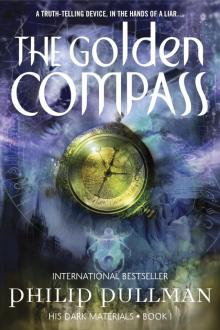 The Golden Compass
The Golden Compass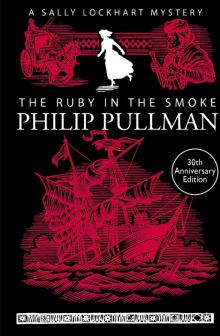 The Ruby in the Smoke
The Ruby in the Smoke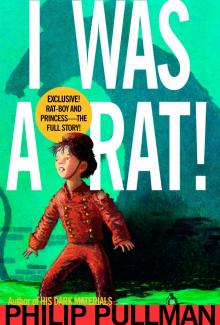 I Was a Rat!
I Was a Rat! Once Upon a Time in the North
Once Upon a Time in the North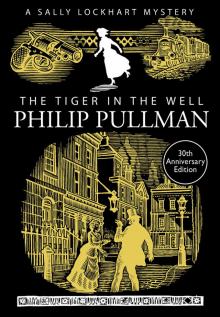 The Tiger in the Well
The Tiger in the Well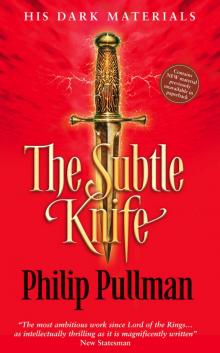 The Subtle Knife
The Subtle Knife The Butterfly Tattoo
The Butterfly Tattoo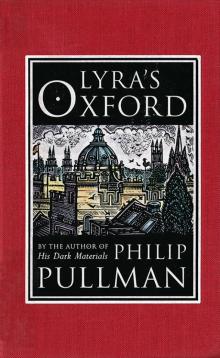 Lyra's Oxford
Lyra's Oxford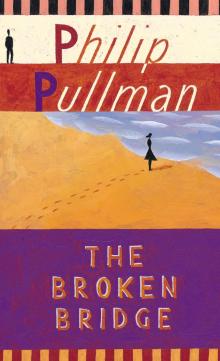 The Broken Bridge
The Broken Bridge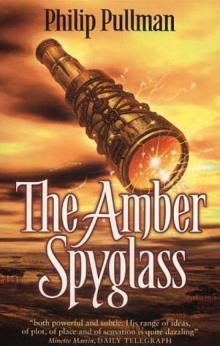 The Amber Spyglass
The Amber Spyglass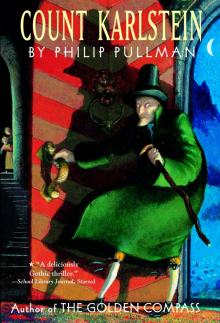 Count Karlstein
Count Karlstein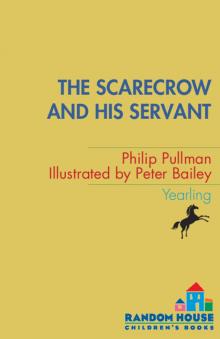 The Scarecrow and His Servant
The Scarecrow and His Servant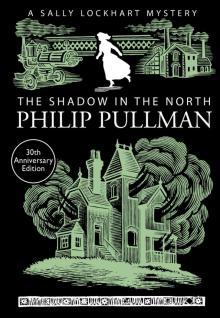 The Shadow in the North
The Shadow in the North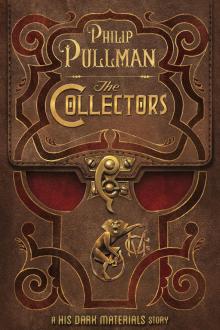 The Collectors
The Collectors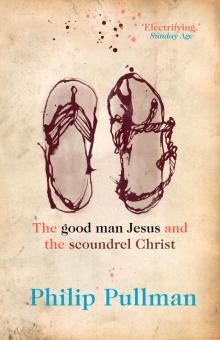 The Good Man Jesus and the Scoundrel Christ
The Good Man Jesus and the Scoundrel Christ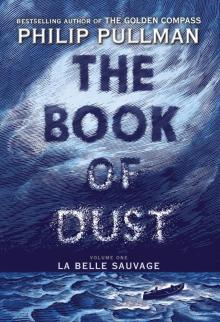 La Belle Sauvage
La Belle Sauvage The Tin Princess
The Tin Princess The Firework-Maker's Daughter
The Firework-Maker's Daughter The Book of Dust: The Secret Commonwealth (Book of Dust, Volume 2)
The Book of Dust: The Secret Commonwealth (Book of Dust, Volume 2)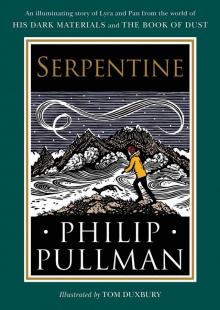 Serpentine
Serpentine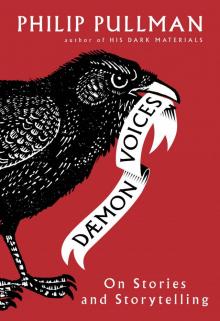 Daemon Voices
Daemon Voices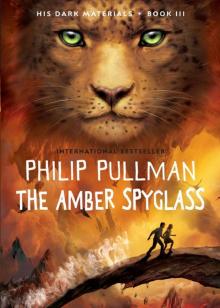 The Amber Spyglass: His Dark Materials
The Amber Spyglass: His Dark Materials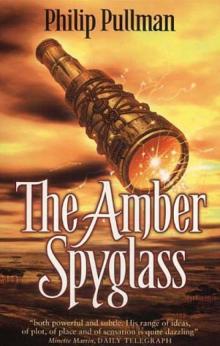 The Amber Spyglass hdm-3
The Amber Spyglass hdm-3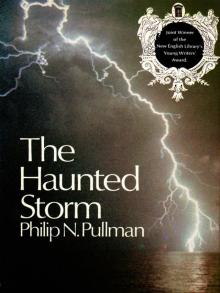 The Haunted Storm
The Haunted Storm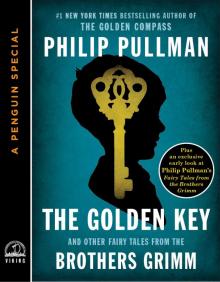 The Golden Key
The Golden Key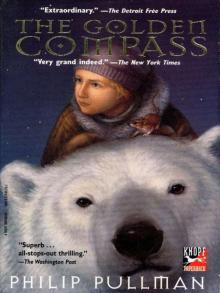 His Dark Materials 01 - The Golden Compass
His Dark Materials 01 - The Golden Compass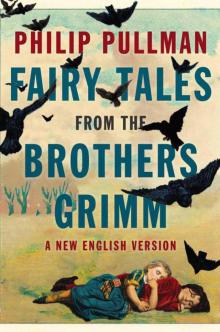 Fairy Tales from the Brothers Grimm: A New English Version
Fairy Tales from the Brothers Grimm: A New English Version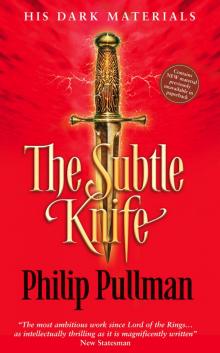 His Dark Materials 02 - The Subtle Knife
His Dark Materials 02 - The Subtle Knife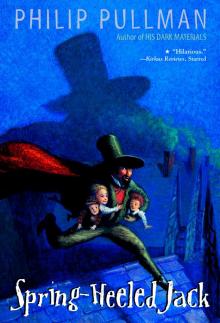 Spring-Heeled Jack
Spring-Heeled Jack The Golden Compass hdm-1
The Golden Compass hdm-1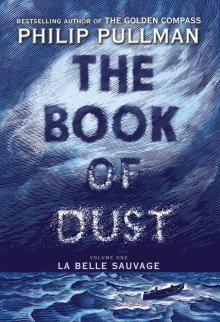 The Book of Dust, Volume 1
The Book of Dust, Volume 1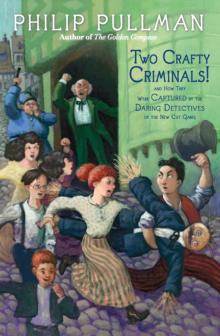 Two Crafty Criminals!
Two Crafty Criminals!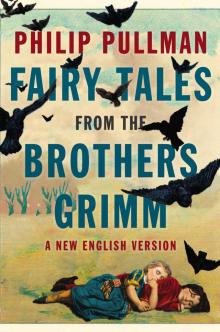 Fairy Tales from the Brothers Grimm
Fairy Tales from the Brothers Grimm The Subtle Knife: His Dark Materials
The Subtle Knife: His Dark Materials His Dark Materials Omnibus
His Dark Materials Omnibus The Golden Compass: His Dark Materials
The Golden Compass: His Dark Materials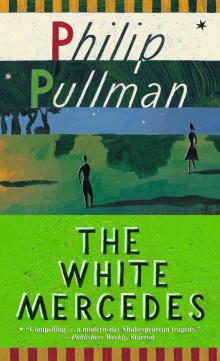 The White Mercedes
The White Mercedes